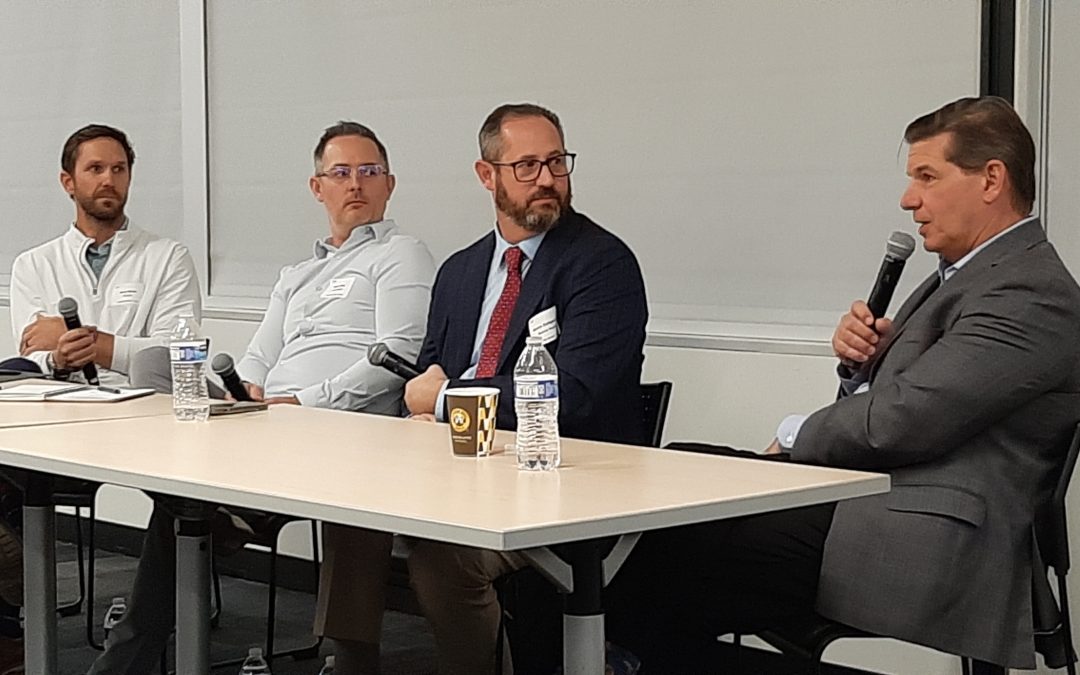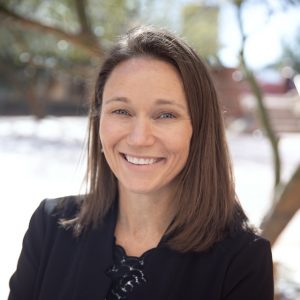The BEX Healthcare Leading Market Series event is almost always the best attended of the year, and the capacity crowd this week at SkySong showed that trend is continuing.
Sponsored by Kitchell Corporation, this year’s panel focused on the changes in development and facilities planning brought about by current market forces and regulatory evolutions, including this year’s Big Beautiful Bill and its impacts on healthcare reimbursements.
The LMS panel consisted of:
- Peter Gray, Associate VP, HonorHealth;
- Aron Kirch, Regional Executive, Kitchell Corporation – Moderator;
- Russ Korcuska, Senior VP – Facilities & Supply Chain, Phoenix Children’s Hospital, and
- Aaron Zeligman, Senior Project Executive – Facilities Services, Planning + Design, Banner Health.
Two items significantly impacting hospitals and healthcare operations have been the rate of Medicare and Medicaid reimbursements, which will see significant changes under the One Big, Beautiful Bill Act, and the migration of patient services away from hospitals to free-standing specialty service providers, such as outpatient surgical clinics. The panelists spent much of the session discussing these changes and their impacts on their operations and facility planning.
Prompted by a question from Kirch, Gray explained the challenges. First, payments to providers from the Centers for Medicare and Medicaid have generally increased with inflation at a rate of 2-3%/year. Healthcare operating costs for hospitals have risen around 5%/year. Those costs rose appreciably during and after the pandemic.
As to the migration of services, hospital revenues have slipped as patients seek specialized care at outside facilities. As an example, Gray said in 2019, 2.4% of hip replacements were performed in an outpatient setting. Today’s rate is 68%, with the curve expected to grow another 11% by 2033.
“The healthcare systems try to participate the best we can in that migration in order to preserve revenue,” Gray said, “but that revenue is slipping away from the health system.”
Turning to the new legislation, Gray said the impacts have not yet been fully understood, but systems are anticipating “a significant compression of net revenues within the health system,” depending on the hospital and patient demographics, which will make the next five-to-seven years very challenging.
Hospitals and healthcare systems routinely upgrade systems and facilities, and the reduction in revenue will impact expansion plans, he said. Other funding mechanisms, such as bonds and philanthropic sources, will become necessary if they are to achieve the goals expressed in their five- and 10-year plans.
“We run pretty darn lean today,” he said. “We’re going to have to lean out the expense categories across the board in the health system in order to hit the breakeven point in the years ahead if all these elements… start to compound.”
Taking up that point, Zeligman agreed, explaining simply that lower revenue equals a lowered ability to reinvest in facilities, renovation and other capital expenditures. “We’re not on a great path,” he said.
Korcuska said the added challenge for PCH is a decline in the pediatric population as birth rates continue to fall. He predicts growth flattening and an enhanced focus on operational savings and efficiencies. With that in mind, however, he added there is still a need for building and equipment replacement, as well as interior space reinvestment, as facilities continue to age.
Meeting the Operational Challenges
All the panel members agreed innovation and modernization of existing facilities will continue to be a leading point of focus. Space enhancements and upgrades in the form of tenant improvements will be a key part in meeting modern patient needs under operational constraints.
Networking, partnership and cross-collaboration will also become increasingly important. Zeligman pointed out it is impossible for hospitals to keep up with community growth, and the proximity of the average resident to the nearest hospital will continue to change. Korcuska agreed, saying people are willing to drive for specialized care, but the days of being just a few minutes’ drive to the nearest large care facility are dwindling.
Gray said hospitals are going to be building less new space in the immediate future, adding current costs equal roughly $1M/patient bed, and the sector will see more specialty micro-care units, as well as an expansion of virtual care services.
Care Facilities and the A/E/C Community
As the industry’s capacities and operational demands shift, the ever-important need for collaboration with the design and construction community will become even more vital. Kirch asked the panelists to detail what they most want and need from their partners in architecture and building.
All the members agreed collaboration and a vocal willingness to share expertise and advice are paramount.
Zeligman emphasized designers need to be willing to challenge owners’ assumptions, ask questions, provide flexibility and have the ability to deliver quickly with a minimum of protracted engagement bogging down the process.
“I want you to ask the questions: ‘What is the information that I actually need? What is the process we have to follow? How can we get this done together?” he said. “You’re all smart people. You know how to do this. You don’t need 19 meetings to design something you’ve designed 500 times before.”
Korcuska followed that by telling the room to challenge the owners and to ask the questions the owners might not have thought of. He particularly pressed the audience to focus on creativity that delivers results while reducing costs.
“Because we have these headwinds… if you can come up with a creative way to get what we want with less material or a different view on the layout of a room that’s less expensive, we absolutely will look at it.” He also emphasized long-term value over short-term savings. “I’m willing to pay more money up front to save money down the road. Absolutely. All day long.”
The panelists also advocated for the accuracy of estimation and the importance of cost projection. Gray was, perhaps, the most adamant and argued repeatedly for providing as close to real-time cost estimation as possible, emphasizing how keeping estimation and pre-construction cost estimates as close to the amounts approved by facility boards improves time to market, efficiency, overall timelines and quality of relationships between owners and project providers.
Turning the tables, Gray asked Kirch how owners can help A/E/C partners with their resource and planning processes. Kirch said the biggest challenge from his perspective is the time lag between project award and project start. He noted start timelines are regularly pushed out, which makes scheduling the right team of experts and quality work crews nearly impossible.
Gray again reiterated the need for real-time estimation, explaining one major cause of timeline delays is when the initial cost projections evolve to no longer align with the budget amounts approved by the boards.
As the session drew to a close, panelists were asked to provide their final thoughts. Korcuska told the attendees to keep improving and always be ready to take the next step. Zeligman urged the room to get involved in educating and supporting others in the field, and Gray compelled attendees to help mentor and train the next generation of experts to ensure institutional and process knowledge is maintained in the future.


 STEVE BOSCHEN
STEVE BOSCHEN WENDY COHEN
WENDY COHEN ERIC FROBERG
ERIC FROBERG



 REBEKAH MORRIS
REBEKAH MORRIS